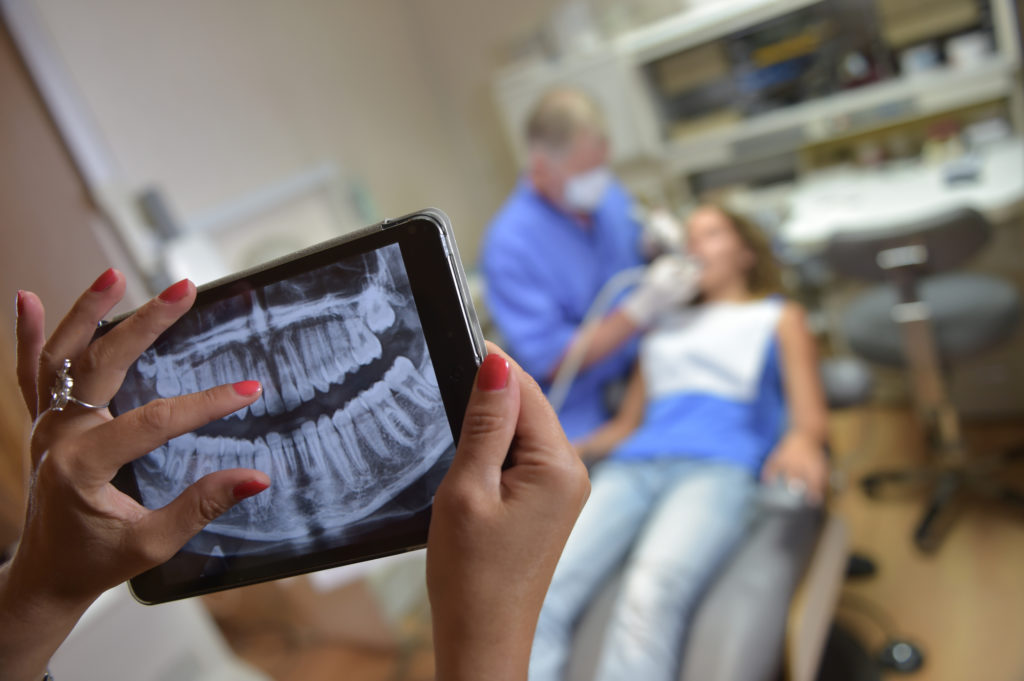
There are “hidden dangers” inside your mouth. They usually don’t hurt. Most of the time you can’t see them. Sometimes they can come as tell-tale signs of other infections and conditions, but oftentimes they do not. What’s more, according to current research, they may affect women over 60 more than any other group.
I am talking about the little-known but all-to-common dental condition called cavitations.
What Are Cavitations?
Cavitation, sometimes referred to by a related condition called “NICO” (Neuralgia Inducing Cavitational Osteonecrosis), is a “hole in the bone.” More specifically, it is a hollowed-out, infected area in the jawbone.
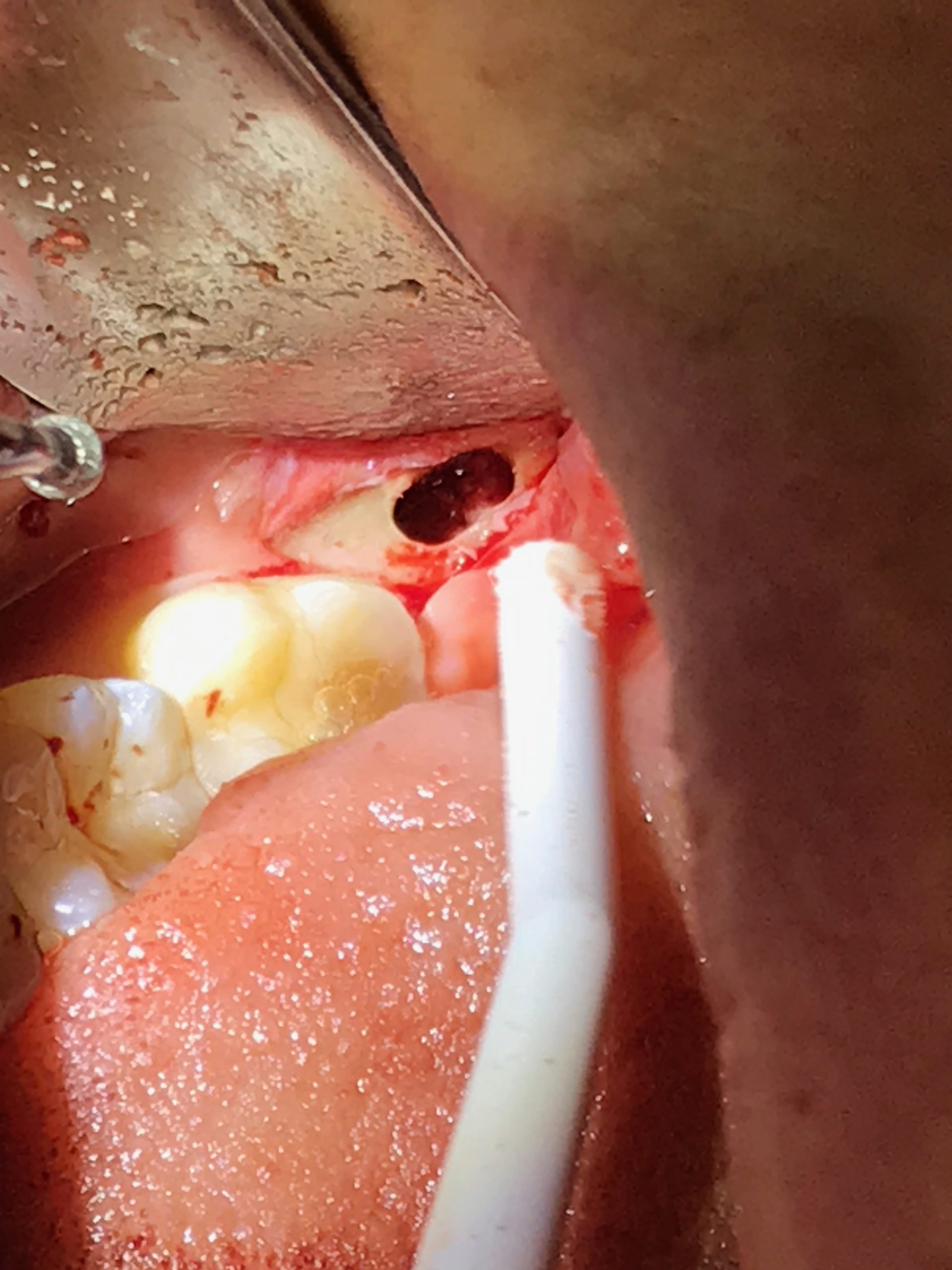
Cavitations typically occur months to years after dental surgery. When bacteria gather in the surgical or extraction site and begin to multiply, they burrow into the bone and create a localized site of infection. When this happens, a cavitation or hole is created. In fact, over time, pathogenic bacteria can create multiple holes in the jawbone. As they eat away at the tissue, the bacteria continue to multiply. These bacteria can drip toxic by-products.
Over time, the bacteria and other pathogens begin to affect the entire body. Holes from cavitations allow the bacteria to leak into the bloodstream. The result can be autoimmune reactions and other chronic disease conditions. A 2002 report published in the journal Clinical Infectious Diseases found that cavitations may play a role in the development of atherosclerosis. Other studies have discovered a direct connection between autoimmune conditions and Breast Cancer.
How Can You Tell If You Have Cavitations?
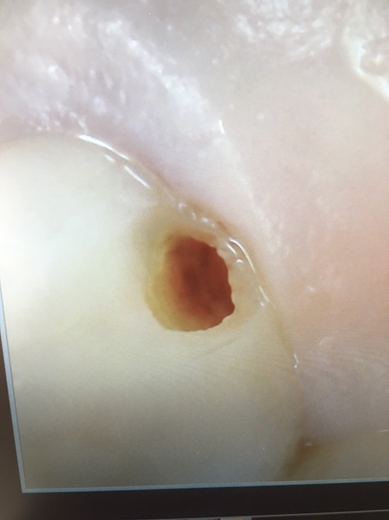
The tricky part about cavitations is that they can be elusive. There is rarely pain at the site of the cavitation unless it has created a severe infection in the bone. Cavitation symptoms are often vague and can be connected to many other conditions. Digestive upsets, fatigue, muscle aches, migraine headaches, and fibromyalgia are just some of the possible symptoms linked to cavitations.
My Story with Cavitations
I learned about cavitations the hard way. During my second healing journey with Breast Cancer, I was again reminded of the importance of staying on top of Essential #5 of the 7 Essentials System® – Embracing Biological Dentistry.
My story actually started way back when a dentist extracted a tooth when I was a teenager. Jumping forward to my first healing journey in 2004, I discovered a cavitation in the lower left tooth (#21). This tooth corresponded with the left breast meridian. Then, in 2017, during my second healing journey, I decided to focus on oral health again. My biological dentist thought I had a small cavity in my top left molar. Once she started drilling she realized that the inner part of my tooth was empty – or dead.
She went on to tell me about a rare condition called Root Resorption, which is an autoimmune response where the immune system attacks a tooth and eats away at it from the inside out. Interestingly, that tooth sat on #14 which was also connected to the left breast meridian!
I then went a step further and had a 3D Bone Scan of my mouth, only to discover that I had 4 cavitations that needed to be addressed. I visited Dr. Stuart Nunnally in Marble Falls TX to have the cavitations properly addressed.
Was there a link between the cavitations and the auto-immune response and the recurrence of Breast Cancer? Absolutely.
Studies have shown us the direct connection between any kind of periodontal or oral cavity stress (such as root canals, cavitations, or just periodontal disease) and Breast Cancer. According to the very well-researched and evidence-based principles of Traditional Chinese Medicine (TCM), whenever there is a block in the flow of energy (or “chi”) in major meridian centers, that is where the major disease is most likely to occur. You can learn more about TCM-based energy currents and dental health HERE.
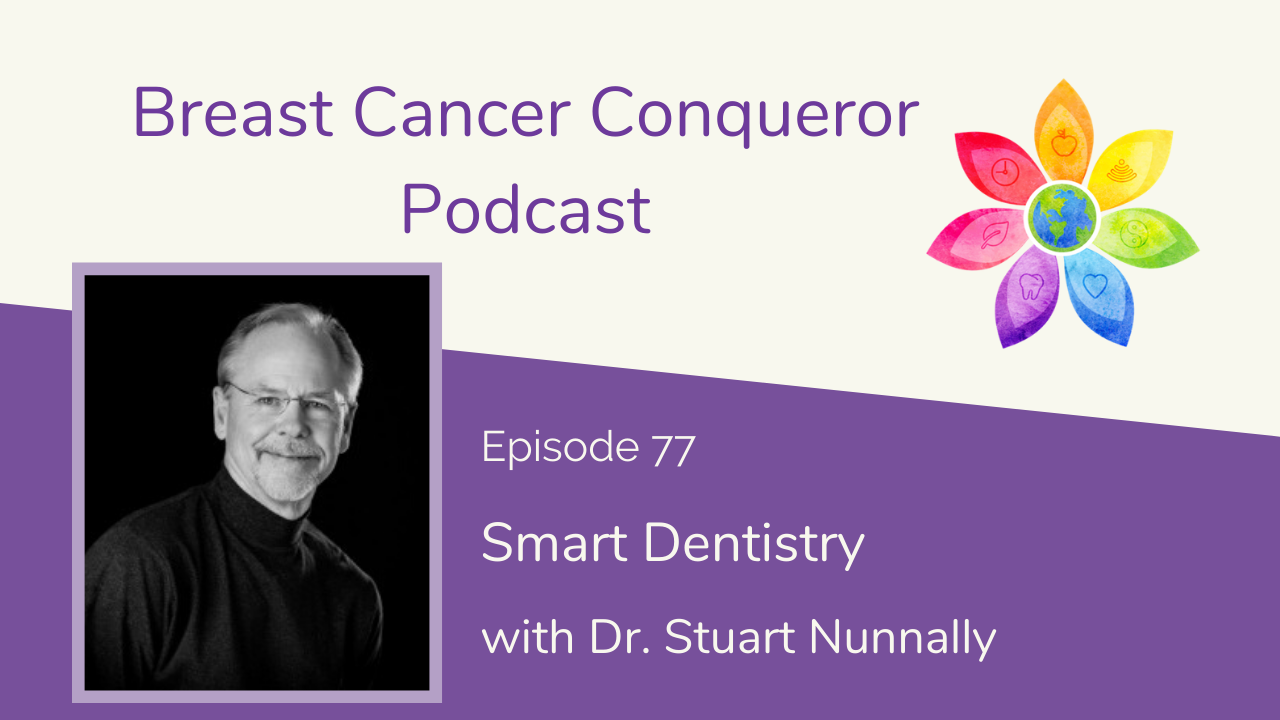
By the way, Dr. Nunnally is still one of my favorite dentists! He is one of the most visionary, outspoken, and insightful biological dentists out there today. In fact, I recently had the honor of conducting an interview with him on biological and “SMART” dentistry for the Breast Cancer Conqueror Wellness Warrior podcast. You can listen to it HERE.
What Can You Do About Cavitations?
Even though cavitations can be tricky to discover and the symptoms may be difficult to determine, learning about them is a huge step in the right direction! Here are some other tips to consider when putting a plan into action:
#1 Do a symptom self-assessment.
Before you even make the call to connect with your biological dentist, take a minute to simply write down all of the possible symptoms that may be related to cavitations. Write down everything you are experiencing, from achy knees to digestive upset to a breast cancer diagnosis. Be sure to include any jaw or tooth pain in your assessment as well.
#2 Do an oral area self-history.
At the same time, it is helpful to do a quick review of your journey in regard to oral health. Have you been diagnosed with periodontal disease in the past or do you have it currently? Do you have any root canals or amalgams? Have you had any trauma in that area of your body? Have you had any teeth extracted? As I discovered regarding tooth extraction when I was just a teenager, cavitations can linger and wreak havoc for years! Weak areas (such as teeth surrounding a root canal or an area of periodontal infection) can be targets for cavitation as well.
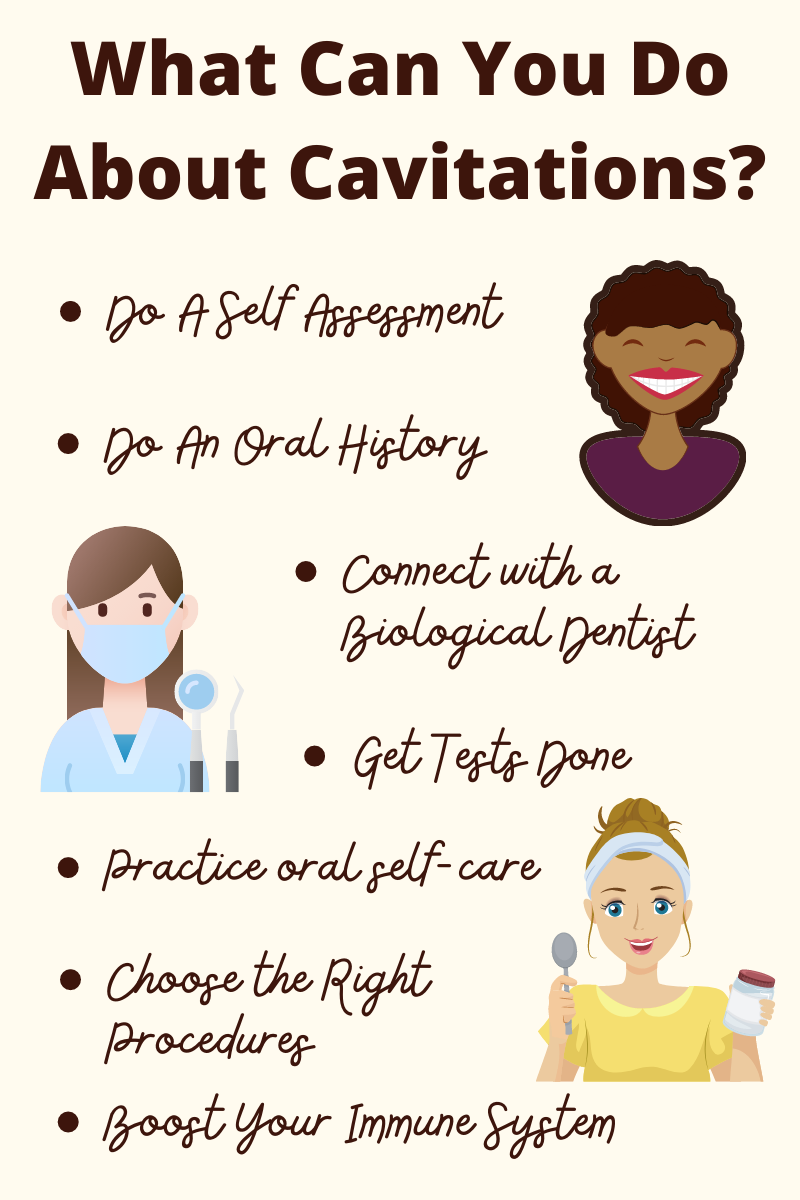 #3 Connect with a biological dentist.
#3 Connect with a biological dentist.
After you have done your self-assessments and you understand what cavitations are by reading this article, then connecting with a biological dentist becomes paramount. Working with this kind of dentist is a must-do since conventional dentists are not going to know about many of the conditions that can affect overall health (such as cavitations, root canals, and heavy metal toxicity). What’s more, conventional dentists often use toxic materials in your mouth. For the complete rundown of what to look for in a biological dentist (for amalgam removal and for any other procedure), be sure to check out this article. In addition, you can also locate a biological dentist in your area.
#4 Get the right tests done.
A legitimate biological dentist is going to know exactly what to do as the first step in discovering cavitations from the day you step into his or her office. That first test is called a Dental Cone Beam CT scan. This is a special kind of X-ray that uses 3-dimensional imagery to see the teeth, the nerve pathways, the soft tissue, and the jawbone in a single scan. Regular dental X-rays are insufficient since they look at your teeth in 2 dimensions. Cavitations are best seen in a 3-dimensional picture. Oral DNA saliva testing and thermography may also be recommended to determine if cavitations or infections are lurking in your mouth and jaw.
#5 Choose the right procedures for you in addressing cavitations.
Once your biological dentist can see what is going on by analyzing key tests, then he or she can put a game plan together for your care. Sometimes, bacterial colonies in cavitation zones can be treated without surgery. Ozone therapy (in the form of ozone injections into the jaw area) is sometimes used. Other modalities include homeopathic therapies, vitamin C therapy, and probiotic use. Ideally, oral surgery is often necessary to clean out infected and dead tissue that harbors pathogenic bacteria.
PRP treatment is another modality that recent research is showing may be especially beneficial for regenerating damaged tissue after cavitation or because of periodontal disease in general. PRP stands for “platelet-rich plasma” and is created by the centrifugation (i.e. spinning) of one’s own blood to extract growth factors and other repair mechanisms.
#6 Practice oral self-care to prevent cavitations from occurring in the first place.
Once your biological dentist has removed and treated the cavitation, then it is time for you to take charge of the prevention side of things. In addition to following all of the 7 Essentials® that are part of any healthy, cancer-prevention lifestyle, it is especially important to put into place specific disciplines that can take your oral care up a notch. This should include regular flossing and brushing, of course, but also oil pulling (using essential oils) as well as oral irrigation. Be sure to check out this recent article for more information as well as some great oral care products that I recommend!
#7 Boost Your Immune System With Specific Supplements.
Another key component of maintaining oral health is providing the substances for overall detoxification and immune-boosting. Remember that ultimately bacterial overload anywhere in the body is largely determined by how robust your immune system is. The more you can help rebalance and strengthen all of the functions of the immune system as well as the detoxification systems in your body, the better you are going to be at preventing oral-related conditions in general.
Glutathione Power is designed to boost and support the natural production of this supercell detoxifier for healthy cell production and tissue regeneration. B Supreme is a special combination of B vitamins and B cofactors that can support methylation. Finally, Metal Detox is designed for those who have had amalgam fillings and are on the path of healing from metal toxicity overload.
Be “In The Know” About Cavitations
I know that cavitations may seem like just another scary thing to worry about on your road toward preventing and healing Breast Cancer. Once you are aware of what cavitations are, you are putting yourself ahead of the curve! Armed with knowledge, you can go forth and put together a protocol strategy that works for you. I hope that this article can point you in the right direction when it comes to the importance of dealing with cavitations and prioritizing oral health on your healing journey.

Thank you for the
important info about
cavitations which is much
appreciated. Perhaps, I’ve
had this problem for quite
a while. Unfortunately, I
haven’t found a biological
dentist in my major city.
What can I do to rectify
problem? Thank you for
your assistance.
This might help http://www.iaomt.org/meber-listings-smart-member/
Do biological dentists take regular dental insurance and are they expensive? How can I locate one in my city?